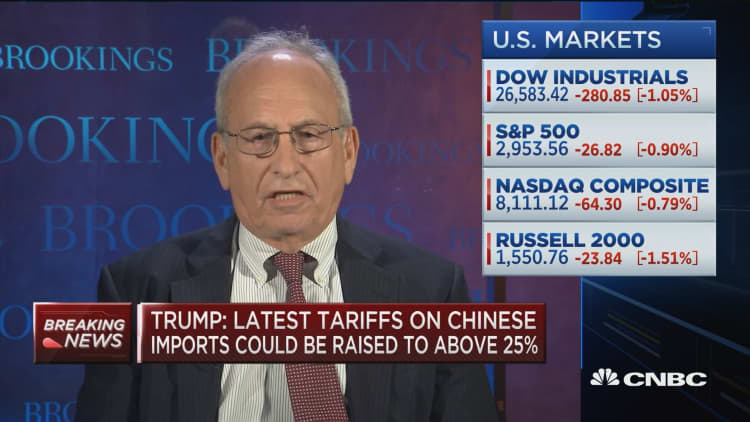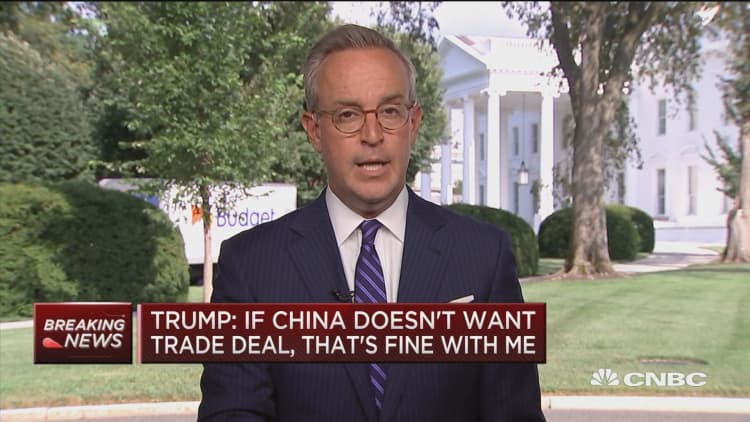President Donald Trump's threats of a new round of tariffs on $300 billion in Chinese goods increases the chances the U.S. economy could head into recession, and also that the Fed would be more aggressive cutting interest rates in an effort to head it off.
The president's tweet came a day after he expressed his dissatisfaction with the Fed's quarter point rate cut, saying that Fed Chairman Jerome Powell "let us down."
Before Trump's midafternoon tweet, the Dow was up more than 250 points Thursday and bond yields were lower on expectations that the Fed would have to cut rates more than Powell suggested during his press briefing Wednesday. The Fed cut rates by a quarter point in its first rate cut in more than a decade but disappointed markets by not signalling much more of a reduction.

Trump's tweet sent stocks spiraling and the 250 point gain turned into a more than 280 point loss for the Dow at the closing bell. In a flight to quality trade, investors dove into bonds, driving yields sharply lower. The 10-year yield, which moves opposite price, dipped to a 2016 low of 1.87% from a high of 2.05% early in the day.
"If he follows through on that threat, that is the fodder for recessions," said Mark Zandi, chief economist at Moody's Analytics. "Recession odds probably go over even, and I think it would be pretty hard to avoid a downturn, regardless of what the Fed does.The Fed will have to respond and the Fed will have to cut rates. The bond market will get what it is anticipating, and that is four rate cuts."
The new tariffs, according to Trump's tweet, would go into affect Sept. 1 and would be 10% on $300 billion in goods, on top of the 25% on $250 billion already in place.
Trump later said, on the White House lawn, that he could raise tariff even more, and put 25% tariffs on the $300 billion in goods. He said China President Xi Jinping says he wants a deal but is not moving fast enough.
Trump said his negotiating team returned from talks this week in China and said discussions would resume in September.
"Until such time as there's a deal, we'll be taxing them," said Trump.
As yields slid, the Treasury curve inverted more in the spread between the 3-month to 10-year. That means the 3-month bill yield at 2.07% was about 29 basis points higher than the longer duration 10-year yield, which would normally be higher. The so-called inversion is a reliable signal of a recession and has been concerning the bond market.
The tariff threat amplified concerns. "It is a growth negative impulse, which incrementally raises the chance of a recession. It raises business uncertainty. Powell was very clear that the biggest threat to the U.S. economic outlook was the trade war, and it just got deepened," said Jon Hill, rate strategist at BMO. "It makes sense the probability of a recession just went up similarly.That's the reason why the probability of a Fed rate cut just went up. The Fed will cut again to extend the economic cycle and avert a recession."
The bond market had already staged a very dramatic move prior to the president's tweet. It had reversed a move from Wednesday when traders reacted with disappointment to Powell's comments that the Wednesday rate cut was just a "midcycle adjustment," meaning not the start of a big cutting cycle.
By Thursday, traders began to bet against the Fed, and market expectations for inflation fell. At the same time, the market began to reprice for more rate cuts and stocks rallied in early trading.
"Now the market has no confidence in Powell and you get surprise tariffs thrown on top of it. Now you have the twin risk of trade policy and monetary policy. You're right back to December 2018," said Dan Clifton, head of policy research at Strategas. In December, stocks were selling off sharply on fears the Fed had made a policy misstep with its final rate hike, and that the trade war would slam the economy. That reversed just around New Year's when trade talks were set to resume and the Fed began to back away from its rate hiking policy.
"There's been a complacency since the Fed meeting yesterday. That was bad and now you're throwing more bad on it. Trump is probably responding to Powell saying trade policy is a risk. He just created a bigger risk because he wants the Fed to cut rates," said Clifton.
Economists said the impact of tariffs alone won't take a serious toll on the economy, but it's been the corporate response to tariffs that has created a drop in confidence and in investment spending.

"The evidence to date suggests the economy has been able to handle or absorb the direct affects of tariffs. Those costs have been managed," said Michael Gapen, chief U.S. economist at Barclays. "I would say the indirect affect on business confidence and business spending have been notable, so anything that pushes the average corporate into thinking why would we invest and why would we spend has to be a negative for the U.S. outlook."
Clifton said the latest tariffs would be a big hit on consumer products for the first time, going beyond the industrial products and supply chain issues of the past rounds. "The consumer has been a relatively bright spot in the economy. They largely avoided any type of tariffs. Now you're going after the U.S. consumer. Trump would argue companies are not passing it onto consumer. These are Nike shoes. These are iPhones. They have much political sensitivity," Clifton said.
Manufacturing data has been weaker globally and U.S. manufacturing is also slowing. The ISM manufacturing survey came in Thursday at 51.2, less than the 52 expected. It still shows expansion, but the market is sensitive to an overall trend of weakening at factories. Plus, the report came after weak manufacturing data in Europe earlier in the day.
"That's the risk ... if business stops spending and slows its hiring than the consumer may not be immune. The U.S. economy is large. It's over $20 trillion. It can probably handle a $30 billion direct cost from tariffs....It's likely something the consumer can absorb," said Gapen. But the problem is if companies stop hiring and the job market begins to slow. The July jobs report is expected to continue to show strong hiring of about 165,000 when it is released Friday morning.
Gapen said the tariffs also aren't a big threat unless Trump expands them to other countries beyond China. "I think the economy can absorb gradual escalation in trade tension. The real pivot point for me is if we expand the trade wars to include Europe, Japan and other important trading partners," he said.
Gapen said Trump's actions on trade could trigger a monetary response from the Fed.
"The president can force the central bank to do something though the imposition of tariffs, but in doing that the president risks pushing the economy into a recession," he said.
Clifton said Trump may be angry at China over stalling on trade talks and potentially dragging the negotiations out to the presidential election. So he is mounting pressure on China.
"This stuff will work itself out. over time. The market will work this out. The Fed will have to get more dovish," he said.


